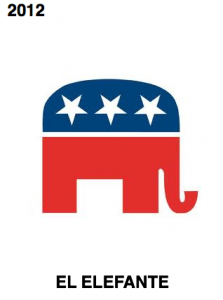How The GOP Can Use Immigration To Win Over Latino Voters
 Despite promoting controversial anti-immigration legislation and impeding access to educational resources for Latinos, the Republican Party has devoted the last five decades to establishing inroads with second- and third-generation Latino voters. These voters share similar conservative beliefs about achieving the American Dream, are generational American citizens, have owned businesses, served in the armed forces or are highly religious. These Latino voters tend to have a higher propensity for voting Republican, despite the long tradition of the mass majority of eligible Latinos voting for Democratic candidates.
Despite promoting controversial anti-immigration legislation and impeding access to educational resources for Latinos, the Republican Party has devoted the last five decades to establishing inroads with second- and third-generation Latino voters. These voters share similar conservative beliefs about achieving the American Dream, are generational American citizens, have owned businesses, served in the armed forces or are highly religious. These Latino voters tend to have a higher propensity for voting Republican, despite the long tradition of the mass majority of eligible Latinos voting for Democratic candidates.
The Kennedy campaign for the presidency provides the most distinct moment during the 20th century when either party seized the opportunity to cultivate potential enclaves of Latino voters in order to assure a political victory. Since, both parties’ efforts to mobilize Latino voters have produced the political infrastructure used by our community to construct and configure Latino leaders. Over time Republicans have had their greatest success with Cuban Americans, while Democratic campaigns have historically relied on the majority of Latinos of Mexican and Puerto Rican ancestry. However, both parties have to endeavor to redefine themselves to each new Latino immigrant subpopulation and their offspring.
Age, education and income are the primary predictors of voting in America. Given the relative youthfulness, limited educational outcomes and lesser economic positioning, it is not surprising to discover that in the best case scenario, 1 out of 5 Latinos will vote in a presidential election and 1 out of 8 Latinos will vote in a congressional election. Currently, the most reliable Latino voters are the elder members of the community who have long histories with local and national candidates who seek to improve their quality of life through an assortment of campaign promises.
With the continued departure of the Latino baby boomers, especially Mexican Americans, the Republican Party has a distinct opportunity to lure a massive sector of young Latinos and newly naturalized citizens from throughout Latin America. The birthrate occurring throughout the Mexican American population now eclipses the influx of immigrants from Mexico. Instead of persecuting immigrants as a method of rallying voters, cultivating the children of Mexican and Latin American immigrants will grow not only the tax base and our economy, but also galvanize the fastest growing sector of Latino voters.
Republican leaders and emerging candidates should remember that their investment in these new Latino voters can produce a tactical advantage over their Democratic rivals, it just requires a new set of eyes to perceive the value of what this up-and-coming population represents for future elections. New citizens have greater rates of voting and utilizing their access to elected representatives, so it’s not to anyone’s advantage to alienate newly naturalized voters or citizens who are the children of immigrants.
The Republican Party can take their momentum from the 2010 congressional campaigns to position an even greater wave of viable Latino candidates for upcoming elections by simply doing what Kennedy did all those years ago: treat all Latinos, regardless of citizenship, with respect and facilitate their pursuit of the American Dream for the benefit of the social and economic future of our entire country.
Joseph P. A. Villescas, Ph.D. is an independent consultant, writer and instructor. He conducts extensive investigations on Latino and other multidimensional populations that explore trends in their educational development, media consumption, internet usage, voting behaviors, racial categorization, organizational capacities and readiness for future leadership roles in community settings. He is also the founder and owner of Villescas Research, Media & Instruction, LLC.
[Illustration By News Taco]
